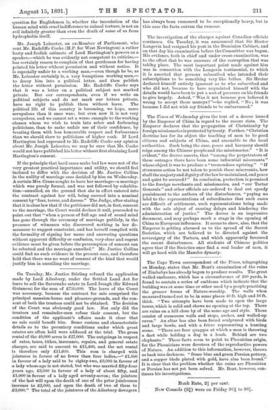If the principle that hard cases make bad law were
not of the -very greatest practical importance and utility, we should feel inclined to differ with the decision of Mr. Justice Collins in the nullity of marriage case decided by him on Wednesday. A certain Mrs. Crane sought to have her marriage—a marriage which was purely formal, and was not followed by cohabita- tion—annulled, on the ground that she in effect entered into -the contract against her will, being coerced into a nominal consent by "fear, terror, and duress." The Judge, after stating that it is clear law that if the petitioner did not, in fact, consent to the marriage, the Court would declare it null, proceeded to point out that "when a person of full age and of sound mind has gone through the ceremony of marriage publicly, in the presence of witnesses who discovered nothing in her de- meanour to suggest constraint, and has herself complied with the formality of signing her name and answering questions without apparent difficulty or confusion, very clear and cogent -evidence must be given before the presumption of consent can be rebutted and the marriage annulled." Mr. Justice Collins could find no such evidence in the present case, and therefore held that there was no want of consent of the kind that would justify him in annulling the marriage.


































 Previous page
Previous page